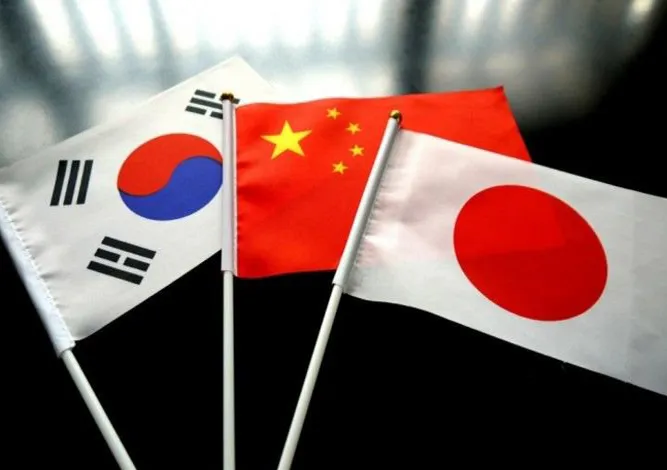
Discussions to restart the China-Japan-Korea (CJK) Trilateral meeting have been met with cautious optimism. Germinating in 1999 as an informal meeting on security issues between the heads of state under the aegis of the ASEAN Plus Three (APT) meet in Manila, the collaborative discussions among the three countries were met with immense scepticism. But by the early 2000s, an “Action Strategy” had been established spanning areas such as intellectual property rights, resource conservation, security imperatives, and North Korean denuclearisation. In 2008, post a major roadblock, the first independent Trilateral Summit in Fukuoka, Japan, signalled a watershed moment—with the Trilateral Cooperation Secretariat opening in Seoul in September 2011. Even while frayed bilateral circumstances continued to undercut trilateral meetings, lower-level (and crucially non-political) exercises took place, particularly in the realm of finance, science, and environment—with the Trilateral Tabletop Exercise of 2013 becoming a significant operating framework of joint response to natural disasters, post the 2011 Japan earthquake and nuclear meltdown in Fukushima.
The substantial improvement in bilateral ties of both Tokyo and Seoul with Washington and the first trilateral meeting among the three earlier in 2023 is poised to alter the region’s equation slowly but steadily.
Recent developments in Northeast Asian geopolitics have not been conducive from Beijing’s perspective. The substantial improvement in bilateral ties of both Tokyo and Seoul with Washington and the first trilateral meeting among the three earlier in 2023 is poised to alter the region’s equation slowly but steadily. Efforts to make Seoul and Tokyo gravitate away from Washington’s sphere of influence are expected from Beijing. One such avenue is the CJK trilateral forum. Nonetheless, while the recent Foreign Ministers meeting among China, Japan, and South Korea sparked speculations about a revival of the trilateral, how the meeting ended is an indication of what lies ahead for the grouping at least in the near future.
Japan happens to be one of China’s top five foreign investors, while South Korea and Taiwan are some of the biggest importers of Chinese goods and services. A triangular trade relationship flourishes as China continues to import intermediate goods from Japan and South Korea to process into final products and ship to other Asian countries as well as the United States (US). A decade earlier, an inter-CJK Foreign Trade Agreement could have had the potential to spearhead a multilateral region-wide FTA in East Asia—leading to deeper integration of the Asian market, perhaps even including provisions on non-tariff, technical barriers to trade as well as sharing supply chains and production networks. From Beijing’s perspective, riding on the impetus provided by the already existing comprehensive economic partnership with Korea (since 2010) and a similar agreement with Japan (since 2011)—a similar partnership with China on the bilateral level would not only smooth over many extant differences but also pave the way for a multilateral cooperative network.
A decade earlier, an inter-CJK Foreign Trade Agreement could have had the potential to spearhead a multilateral region-wide FTA in East Asia—leading to deeper integration of the Asian market, perhaps even including provisions on non-tariff, technical barriers to trade as well as sharing supply chains and production networks.
The recent convening of top CJK diplomats in Busan, therefore, sparked a flurry of conjectures—with reports of Japanese demands for the removal of the Chinese ban on Japanese seafood amidst Tokyo’s controversial discharge of treated radioactive wastewater from Fukushima, sparking a terse exchange wherein Wang Yi allegedly opposed “irresponsible actions” on the part of Japan. Hecalled for an independent monitoring of the process. In response to South Korea’s call for Chinese efforts in de-escalating North Korean provocations, China is said to have described itself as a “stabilising force” in the region, reiterating its role as something of an arbiter of future constructive relations and urging that the “One China” principle be maintained. Crucially, however, there was ample stress on pivoting to deepening ties for innovation, progress, and relations of mutual benefit, with stress on the maintenance of the momentum for regional economic integration. The three foreign ministers agreed to advance cooperation across security, environment, technology, and economic sectors. They also spoke of the threat that Pyongyang nuclear programme.
Potentially, a Trilateral Summit could be in the works and a meeting early next year could see the re-opening of the trilateral FTA negotiations, as well as three-way cooperation strategies and discussions on varied global concerns. However, a three-way summit, the first one after 2019, has been in the works for a while now with little information regarding when it might indeed be held. Regardless of the optics of the foreign ministers’ meeting in November, there appears to be little in the way of constructive traction for the CJK trilateral for two main reasons—first, Beijing has been steadily boosting its ties with Pyongyang, with the most recent one being close on the heels of the meeting among the three foreign ministers; and second, Beijing’s attempts at pulling Seoul and Tokyo away from Washington have been inadequate at best. China’s Foreign Minister Wang Yi also met his Japanese and South Korean counterparts before all three of them met together and stressed on the “sincerity” that each needed to bring to the grouping. But the crux of China’s messaging at the bilateral meetings as well as the one among all three was to underscore that the US was external to the region and Japan and ROK should toe China’s line. For now, therefore, the CJK trilateral does not appear to have an optimistic future.
Pratnashree Basu is an Associate Fellow at the Observer Research Foundation
Aishiki Chowdhury is a Research Intern at the Observer Research Foundation
The views expressed above belong to the author(s). ORF research and analyses now available on Telegram! Click here to access our curated content — blogs, longforms and interviews.




 PREV
PREV



